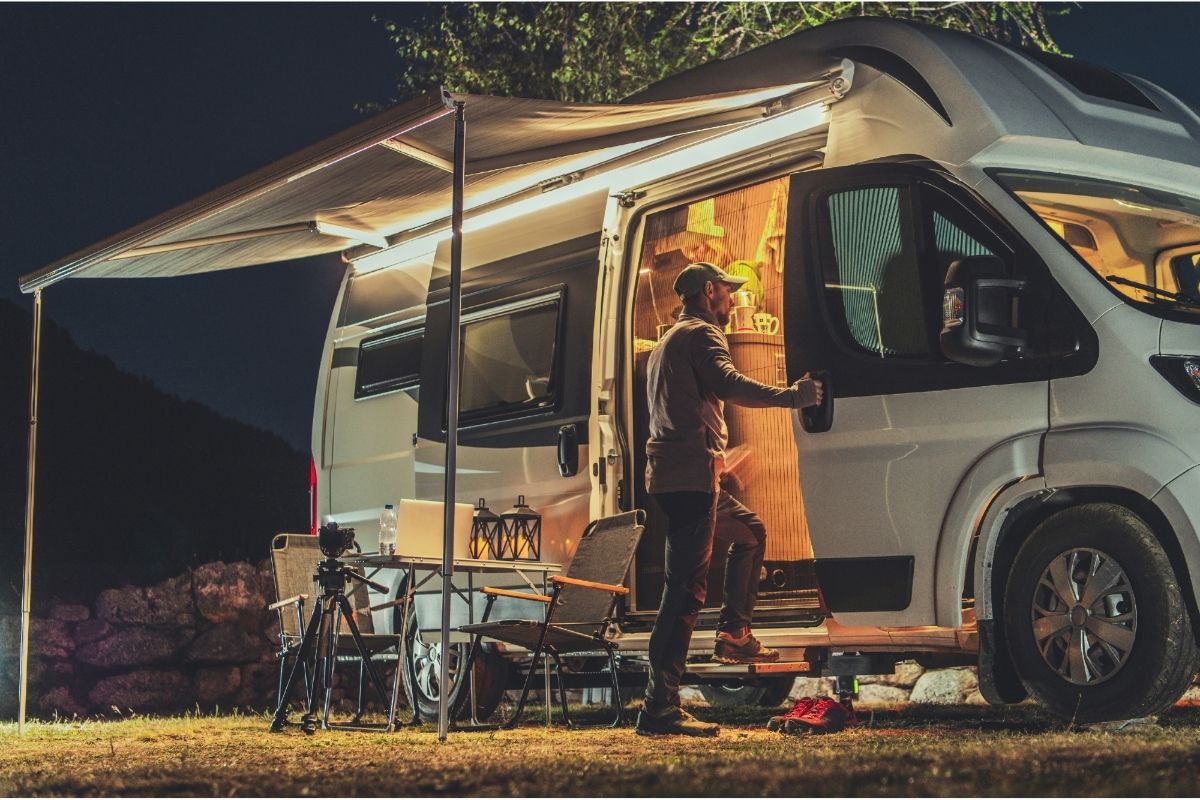Discover How To Use The Power of Authority Marketing To Make You Money While You Adventure!
No Experience, Existing Product Or Technical Skills Are Required
DO YOU BELIEVE ADVENTURES ARE WORTH CHASING?
We're an affiliate.
We hope you love the products/services we recommend on Just Van Life! So you know, there is the possibility we will collect a commission should you make a purchase via any of our links. This will in no way affect the purchase price. Thank you for your support, we really appreciate it!
Camper vans are brilliant. They’re homes on wheels, and who wouldn’t want a house that can rollerblade? But with great power comes great responsibility, and part of the responsibility of being a camper van owner is knowing what all the little gadgets in your home do.
One such finicky gadget is an inverter. Not many people know what these are, but they’re very important. More important than you might first realize.
What Is An Inverter?
An inverter converts direct current (DC) to alternating current (AC). It’s used to convert 12 volts DC from a battery into 120 volts AC for use by appliances like hairdryers, vacuum cleaners, etc, and even bigger ones like campers.
How Does An Inverter Work?
The inverter works by using two coils: one coil generates electricity when it receives a direct current (the other coil does not), and then the second coil uses this generated electricity to create a high-voltage AC output. This means that the inverter takes a low voltage input and creates a much higher voltage output.
This process is called rectification. Rectification is how we get from a single source of energy to multiple sources of energy. When you have a light bulb plugged into a wall socket, the electrical current flows through the wire and into the bulb.
That same current also flows back out of the bulb and down the wire. However, there is no way for that current to flow back up the wire because the wire has only a single path for the current to go. So, the current goes around the bulb instead.
This is why you need to plug things into outlets. You need multiple paths for the current to flow so that the current doesn’t just stay inside the outlet. If you don’t plug anything into the outlet, the current stays inside the outlet and eventually gets lost.
Do You Need An Inverter?
In order to run most modern appliances, you’ll need an inverter. These days, most appliances will work fine without one, but some older models may need a different type of connection.
For example, some old refrigerators had a transformer rather than an inverter. While transformers aren’t as touchy as inverters, they still require a lot more maintenance.
Most inverters come standard with a few features, including:
A fuse or circuit breaker to protect against short circuits.
A switch to turn the device on/off.
A dial to adjust the amount of power delivered to the appliance.
A label to identify the model number of the inverter.
If you plan on running any large appliances, you’ll probably need a larger inverter. Larger inverters usually have a higher capacity rating.
What Are Some Of The Benefits Of Using An Inverter?
There are several benefits to using an inverter. One of the biggest advantages is safety. By converting the direct current from a battery into an alternating current, you eliminate the possibility of a dangerous situation occurring.

If you were to connect a lamp directly to a battery, the lamp would draw too much current and could potentially damage the battery. With an inverter, you can safely put lamps and other devices onto batteries without worrying about damaging them.
Another benefit of having an inverter is convenience. Since you can now plug appliances directly into the wall, you won’t have to worry about finding an extension cord. And since you’re able to use your existing wiring, you won’t have any additional costs associated with installing new wires.
Another advantage of using an inverter is efficiency. Most inverters are designed to be more efficient than traditional methods of powering devices. They do this by delivering more power at lower voltages. As a result, you can save money on your electric bill.
Why Do Campers Need Inverters?
Campers and camper vans typically need to have an inverter. Why? Because campers often have a 12-volt battery bank. But in order for these batteries to provide enough power for all their appliances, they must be connected together in series. Unfortunately, connecting two batteries in a series creates a very high voltage.
The problem with high voltages is that it’s easy to accidentally touch them. If you happen to touch a live wire while working on your vehicle, you could easily receive a nasty shock.
An inverter solves this problem by taking the DC (direct current) from the batteries and turning it into AC (alternating current). Then, the inverter converts the AC into a safe level of electricity.
This allows you to safely be able to use all your camper appliances.
How Do I Know Which Type Of Inverter To Buy?
When shopping for an inverter, you’ll want to make sure that it’s compatible with your specific needs. Here are some factors to consider when choosing an inverter:
The Size Of The Inverter
Smaller inverters are better suited for smaller loads such as lights and small appliances. Larger inverters are better suited to handle larger loads like heaters, air conditioners, and campers.
The Voltage Output Of The Inverter
Many inverters offer two outputs. One output provides 120 volts while the second output offers 240 volts. It’s important to know which voltage you need in order to properly install the inverter.
Whether The Inverter Has A Built-In Surge Protector
Surge protection helps prevent surges of electricity from damaging sensitive electronics.
How Many Amps The Inverter Can Deliver
The maximum amperage rating determines how much power the inverter can provide.
What Kind Of Load The Inverter Can Handle
Some inverters are only capable of handling low-power loads such as light bulbs or small appliances. Others can handle higher-powered loads such as heaters and air conditioners.
Final Thoughts
So as you can see, inverters are incredibly important for safety. When purchasing one, make sure you get one that will meet your needs. For most campers, a typical 12V inverter will work, but again, this depends on the camper’s power.
Be sure to check your model’s best inverter to make sure you get the right one, and this goes for any appliance. Most of the information should be available in any manufacturer’s leaflets and online.
Discover How To Use The Power of Authority Marketing To Make You Money While You Adventure!
No Experience, Existing Product Or Technical Skills Are Required
DO YOU BELIEVE ADVENTURES ARE WORTH CHASING?
